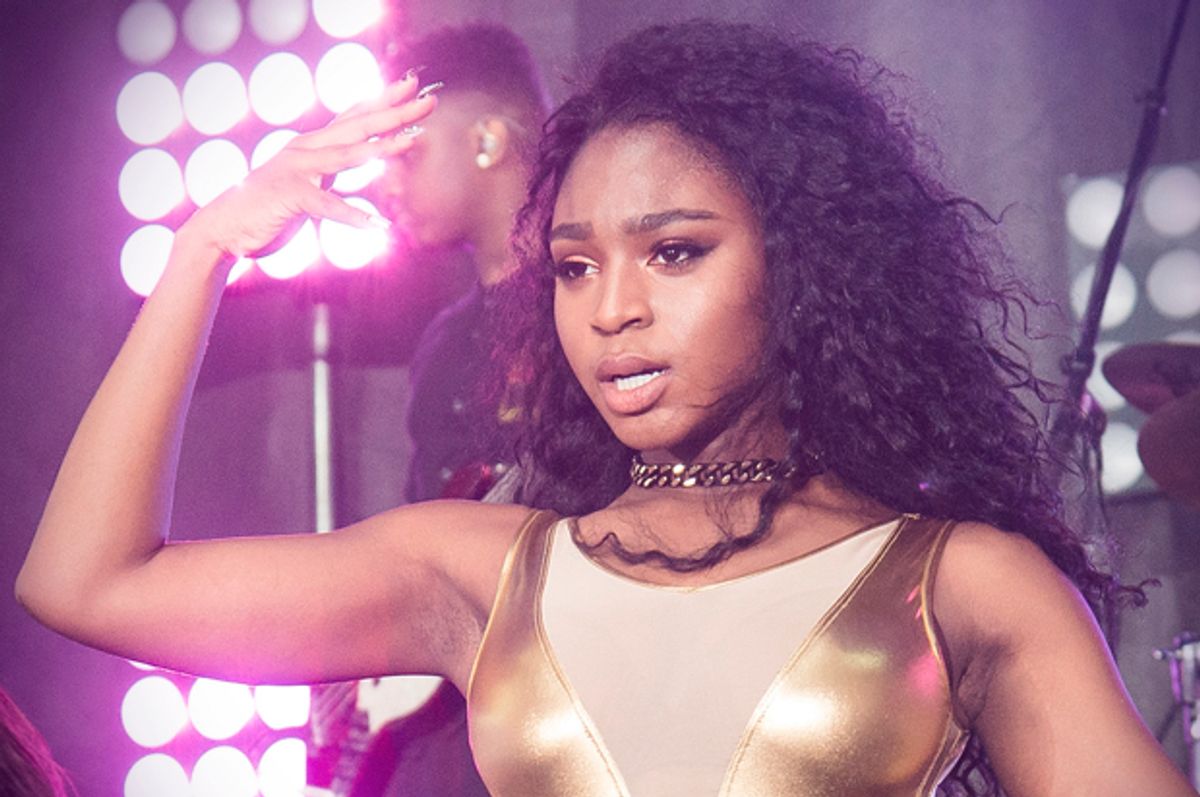In what's become a depressingly common occurrence, yet another high profile person this week took a step back from Twitter after being barraged with explicit racist and misogynistic messages. At what point do the rest of us just follow suit?
Over the weekend, Fifth Harmony's Normani Kordei responded to the torrent of abuse she endured after she dared to pause before responding, during a Facebook Live chat, to a question about her bandmate Camila Cabello’s "best quality." Seriously, that's the motivation. In a statement on Twitter Saturday, she said the incident had been "blown out of proportion" and advised, "I'm not meant for everyone to understand but you can respect me while trying to."
Clearly, the bottom-feeders of social media couldn't take the advice, and on Sunday she announced that she was taking a Twitter break, explaining, "Over the course of this last week and especially over the last 48 hours I've not just been cyber bullied, I've ben racially cyber bullied with tweets and pictures so horrific and racially charged that I can't subject myself any longer to the hate. I'm not the first black celebrity to deal with this and I'm sure I won't be the last… Hiding behind a computer and putting people down, especially for the color of their skin, doesn't make you cool, it makes you a coward!"
And she thanked Twitter for "jumping into action" on the situation. Included among the messages aimed at her was a photo of her head photoshopped onto the body of lynching victim.
As Kordei mentioned in her message, this kind of behavior is sadly not unusual. Last month, "Ghostbusters" star Leslie Jones took a Twitter hiatus after finding herself similarly abused and attacked by a vicious — and fairly well-organized — group of bigots. (Soon after, Jones returned, just in time to delight the world with her Olympics commentary.) Perhaps not coincidentally, Breitbart's Milo Yiannopoulos — who'd mocked Jones and has had a long history of antisocial behavior, was "permanently suspended" from Twitter.
But hey, it's not just racists who are a problem — late last month, feminist author Jessica Valenti revealed on Twitter that "This morning I woke up to a rape and death threat directed at my 5 year old daughter. That this is part of my work life is unacceptable….Law enforcement needs to get their shit together on online threats. Social media companies need to f_cking do something. In the meantime, I'm taking a break from social media. I don't know how long. I just know that I can't live like this. It's too much."
I think most of us accept that monitoring a behemoth social media destination is a huge job and that after cockroaches, the trolls are the most persistent life form on earth. God knows we grudgingly assume that a woman who shares an image of herself is going to get feedback from, as Amy Schumer put it recently, the people who revel in "writing unkind things to a stranger you’ve never met who triggers something in you that makes you feel powerless and alone." Encouragingly, over the past year, more serious legal efforts to crack down on online threats and harassment, especially against women, have gained greater traction. There has been more public discourse around the online abuse that women and minorities face, more acknowledgment that this not normal and should not be accepted as such.
Yet how much blocking and reporting should a person be expected to have to do? How many times can you hear "Ignore the trolls" before getting really fed up? And why does the burden of addressing this crap always fall to the people being bullied? I admire the hell out of those who stick around and stand up against the deluge of disgusting, threatening commentary, even as I find myself eyeing the exit doors. Because it doesn't get better. It doesn't change. Today I was called a "leftist Shiite feminista," but at least nobody's threatened to stab me yet.
I've spent my 20 years of online work and community moderating seeing firsthand how anonymity can be an empowering tool for those who need to speak out in safety — and how it can simultaneously be the coward's greatest weapon. And like Valenti, I've had strangers tell me daughters deserve to be raped. I don't know if that's the greatest incentive to just ditch entirely — or to dig in my heels and keep saying, this isn't your little playground, you sad, under-socialized creeps. All I know is that whenever someone like Kordei takes an absence, I feel angry that the bad guys have achieved their goal. Yet I also know that I don't blame her one little bit.



Shares